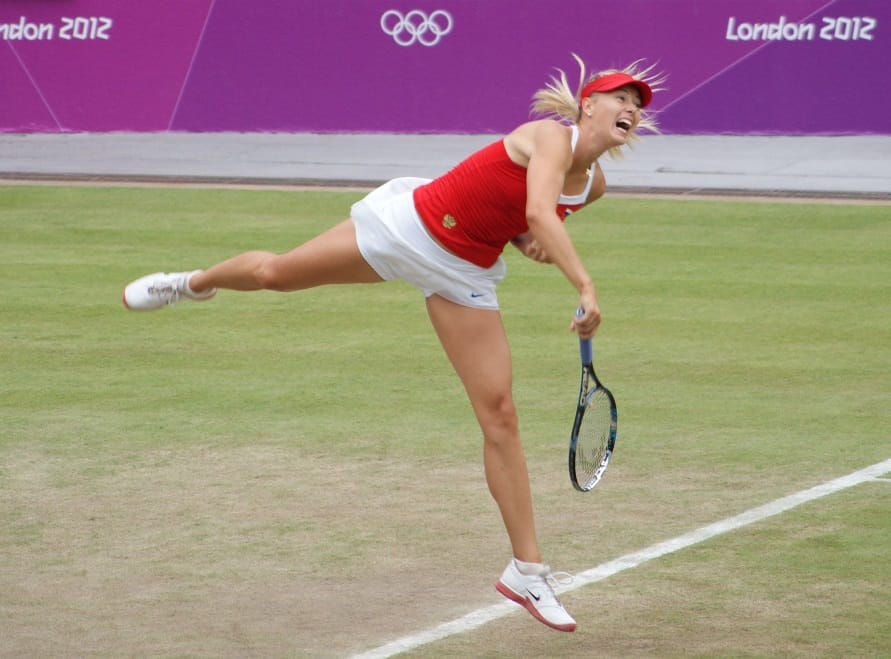Have you ever watched tennis and wondered, “Why the hell are they grunting like that?” It’s a sound you’re likely to hear a lot during a tennis tournament. In this piece below we explain the various facets of grunting along with the issues around it and what kind of controversies have arisen as a result of grunting.
Interestingly, grunting was not always a part of tennis, and it is believed that American star Jimmy Connors was one of the biggest stars to have made the tennis grunt famous in the 1970s.
Before that it was the 17-year-old Victoria Palmer who looked to have introduced the grunt to tennis in 1962.
However, there is evidence that grunting may increase a player’s performance and be a subtle technique to throw opponents off guard.
There are several reasons why players make grunting noises during a game. Let’s have a look at a few of them below.
Table of Content
Why do Tennis Players Grunt?
Increases Power
Scientists have discovered a strong correlation between grunting and striking power, with research revealing that individuals who make some noise strike their groundstrokes with 3.8% more power than those who remain quiet.
In addition, the advantages of grunting are much more significant when serving: grunters serve with 4.9% more power than silent players do. It seems that it is easier to exert more significant physical effort when making a loud noise while you do it.
Could Distract Opponent’s Attention
You may drive your opponent insane, causing them to lose focus and attention. If a grunt is too loud, it might drown out the sound of the ball striking the racket.
That’s a vital sound for players to hear because it tells them how hard a player hit the ball and where it is going. As a result, the grunters get the upper hand and guarantee that their opponent cannot remain focused and concentrated.
This does raise a lot of moral questions on whether grunting should be outlawed because of this very reason – the unfair advantage it might provide to the grunter.
Also Read:
- Why do Tennis Players Wear a Jacket Before & After a Match?
- Best Tennis Coaching Academies in the USA
Aids in Stress Relief
When we are stressed, unhappy, or unmotivated, we all have some techniques to deal with it. Tennis players are in the same boat, and many notable tennis players scream during a tennis match because it helps them relieve stress or anxiety.
Aids in Psyching
Unfortunately, psyching is a significant part of tennis culture, and grunting while playing is merely another kind of psyche. Players who grunt for the sake of psyching usually have a weak intellect. If you’re getting tired of your opponent doing this, do it yourself!
Could Flummox the Opponent
One sneaky method is to let out a tremendous grunt, as if you’ve just played a massive topspin forehand that required a lot of work, but then follow it up with a calm drop-shot. Your opponent could end up being very surprised.
Caroline Wozniacki once stated:
“If you grunt extremely loudly, your opponent won’t be able to hear how you smash the ball. If the grunt is so loud, you can believe the ball is approaching quickly, just to find out that it is moving slowly.”
Again, this raises the morality question and whether tactics like these actually make tennis a better sport or otherwise.
Aids in Getting Better Rhythm
Timing is another significant advantage of the grunt. Making a deliberate effort to synchronize your breathing to your pre and post-ball contact will significantly enhance your rhythm and, as a result, your time.
Tennis requires a great deal of timing. Because there are so many moving aspects in a tennis stroke, hitting the ball accurately and consistently may be difficult if you are not timing the ball effectively.
It’s Natural
A grunt is a typical sound to produce while physically exerting yourself. While this does not explain why there is so much grunting in tennis, it does answer why many players started grunting in the first place.
Consider a weightlifter.
Does he make noise while he’s lifting weights? That’s grunting, and this shows how exercise causes one to make sounds.
Helps Build Confidence
According to psychologists, grunting might make a player feel more confident on the court, and it boosts their confidence on the court, allowing them to perform better.
Also Read:
By Habit
Sharapova’s grunts have hit 100 decibels, making her the loudest grunter.
She has insisted that grunting was something she had done since she was a child, and this was part of her tennis strategy, and trying to quit grunting in her twenties would have been as difficult as learning to wield the racquet with a different grip.
Players Imitate One Another
In all sports, athletes try to copy their idols as much as possible. Andre Agassi and Monica Seles influenced many of today’s players to make loud sounds when they smash the ball.
Players, including Rafael Nadal, Serena Williams, and Maria Sharapova, are inspiring the next generation. Children and teens will make a lot of noise if grunters win Grand Slams. When that generation reaches the pinnacle of the sport, the cycle repeats all over again.
Intimidation Technique
Another reason why some gamers grunt is to intimidate others. When the great Rafael Nadal grunts as he unleashes his enormous forehand, it can undoubtedly add to the panic effect for a player on the other end of the court.
This may not seem to be the most apparent reason to grunt, but it might provide you with a bit of psychological advantage on the court.
What’s the Dispute over Grunting?
Many athletes believe that grunting is necessary and advantageous. Several others, though, are opposed to it.
And some of the reasons associated with it can be found in the list of reasons why tennis players grunt above too. It distracts opponents to the extent it can throw them off their game and make it difficult for them to focus on the game.
While on the one hand there’s no law in the game that prevents players from grunting, it does, therefore, fall in the realms of a moral dilemma. For years now tennis experts have argued over the need to ban grunting from the sport as it gives the grunter an unfair advantage over their opponents.
Martina Navratilova is one of the best players in the world, and she finally admitted in 2009 that grunting was akin to cheating. She said this because grunters produced noise to distract and hinder their opponent from focusing.
The nine-time Wimbledon champion had suggested a one-year adjustment period for players to tone down on their grunting before the governing bodies started penalizing them during matches for excessive noise.
Other tennis luminaries, such as Caroline Wozniacki and Todd Woodbridge, have publicly criticized grunting pros. They even requested that tennis groups investigate the situation.
Interestingly, Stacey Allaster, who served as the WTA chief executive officer between 2009 and 2015, told Outside the Lines the goal is ‘eliminate grunting from the next generation’. So far, nothing seems to have come off of it.
Allaster had also met up with famous tennis coach Nick Bollettieri, who has trained some of the biggest ticket players in the world to discuss the possible issues associated with grunting.
It resulted in his academy, the IMG Bollettieri Academy in Bradenton, Fla., taking a lead in teaching budding tennis players breathing techniques to reduce grunting. This was based on a plan made by IMG Academy’s director of mental conditioning Angus Mugford who acknowledged grunting was a menace, and called it “unsportsmanlike”.
It was also described as a distraction which could cause opponents difficulties in getting their faculties together to “hear the impact of the racket” which in turn also slowed their response time and worsened their decision error.
Should Grunting be Banned from Tennis?
It would be incredibly difficult to prohibit grunting outright as no one has ever surveyed the number of grunters in the game.
A universal ban on grunting would be tough to enforce, and what would the punishment be for grunting, a warning, or a penalty point?
And who would be in charge of keeping an eye on things? Would the umpire keeping score, monitoring the lines, and organizing his ball guys, be able to do so? Would he have his decibel meter in hand to check whether a grunt went above the limit?
There are a lot more questions at this stage around outlawing grunting but not a lot of answers are forthcoming.
How to Handle Grunting as an Opponent?
It’s not the easiest to take on a player who grunts but there’s still a lot one can do to try and handle your opponent’s grunting and improve your own efficiency while playing such an opponent.
Here are some easier-said-than-done mental tactics which you can use to overcome what could be construed as distracting tennis tactics.
Focus on Self
This is bit of a life philosophy too, but a very important one at that when it comes to handling grunting from your opponent.
Whether it’s grunting or any other form of gamesmanship you are left to endure in a match of tennis, it’s best to focus on your own game and look to work your way into the match using your own tactics and skills.
Prepare Well for the Match
That’s what you can do, prepare for the match in the best way you know.
You might want to read our piece on the different ways you can do that, but the gist of it is try and do the right things – remain hydrated, sleep well, study your opponent’s tactics, fine-tune your own, stretch and warm up before the match and so on.
During the match, try to focus on your breathing and do some mental counting between points to try and maintain your own rhythm and concentration.
Take it One Point at a Time
Sometimes things are difficult to begin with but as the match goes on, you could get used to the noise. Take it a point at a time, focus on it and try and do all the right things you had thought of doing during the match.
And Do It Nicely if You Got to Do It…
Sure, there might be a day when nothing works and you might still end up getting distracted by your opponent’s grunting ‘tactics’, especially if you think they are deliberate. And if you think that’s the case and want to talk to your opponent or to the umpire, do it nicely.
For one, there are better chances of getting it your way if you are polite about it but more vitally it reduces the chances of you getting more affected by the grunting than it would if the situation got a tad hot.
Also wait to do it after you have won a point rather than after losing one.
Final Words on Grunting in Tennis
Overall, grunting seems to be deeply entrenched in the game and by the looks of things, is here to stay.
While not all players may feel the need to grunt as loudly or as extensively as some pros, understanding how to breathe correctly before and after hitting the ball could help weed out grunting at the grassroots level.
If you are an opponent, however, there is always that possibility grunting could distract you and it is imperative to accept it as a part of the game rather than fret about the ‘uncontrollable’.


